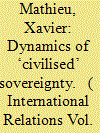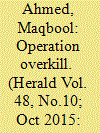|
|
|
Sort Order |
|
|
|
Items / Page
|
|
|
|
|
|
|
| Srl | Item |
| 1 |
ID:
163101


|
|
|
|
|
| Summary/Abstract |
Critical and post-colonial scholars have argued that a more complete account of sovereignty necessitates an exploration of the colonial experiences through which Western civilised identity was forged. But the way these ‘distant’ encounters were used in (and interacted with) the process of claiming sovereignty domestically has received less attention. This is surprising as critical scholars have revealed the existence of strong similarities between the domestic and international constructions of sovereignty (and in particular the necessary performance of a savage Other) and have emphasised how sovereignty transcends the domestic/international frontier and provides a crucial link between the two. As a response, this article develops an analysis of the construction of sovereignty that combines both the domestic and international colonial frontiers on which ‘civilised’ sovereignty relies. I use a large set of primary archives about France in the sixteenth century in order to explore how sovereignty depends on unstable colonial frontiers, that is, differentiations between the civilised and the savage, that are constantly contested and re-established. Combining the domestic and international colonial frontiers reveals how they interact and are used in order to reinforce the civilised identity of the Western ruler.
|
|
|
|
|
|
|
|
|
|
|
|
|
|
|
|
| 2 |
ID:
133796


|
|
|
|
|
| Publication |
2014.
|
| Summary/Abstract |
One of the first members to perish was killed barely a few weeks into the war during the retreat following the Battle of Mons on 23 August 1914. Hon Archer Windsor-Clive, a professional cricketer and lieutenant in the Coldstream Guards, was only twenty-three years old when he died in the successful British defence of the village of Landrecies, in the face of a surprise German attack on 25 August. He was one of a great number of casualities suffered by the British Expeditionary Force (BEF) on this day; indeed, 133 members of his battalion were killed, wounded or missing in action after the encounter. Windsor-Clive, the third son of the First Earl of Plymouth, represents the generation of men, regardless of wealth and background, who died at a tragically young age defending their country. In the normal course of events, these young officers - members of RUSI - would have been destined to become the nation's military and political leaders. Windsor- Clive is buried at the Landrecies Communal Cemetery in France.
|
|
|
|
|
|
|
|
|
|
|
|
|
|
|
|
| 3 |
ID:
145483


|
|
|
|
|
| Publication |
New Delhi, Alpha Editions, 2016.
|
| Description |
xiv, 473p.pbk
|
| Standard Number |
9789385505843
|
|
|
|
|
|
|
|
|
|
|
|
Copies: C:1/I:0,R:0,Q:0
Circulation
| Accession# | Call# | Current Location | Status | Policy | Location |
| 058680 | 355.033073/HOO 058680 | Main | On Shelf | General | |
|
|
|
|
| 4 |
ID:
141565


|
|
|
|
|
| Summary/Abstract |
Something unusual happened around this time last year. A 25-year-old Pakistan Army soldier, Tariq Yunus, was kidnapped from Karachi’s Saddar area where he was shopping and was shot dead later. The police called his abduction and murder a “reaction to the killing” of a suspected Lyari gangster in an “encounter” — or a shootout. “First such incident in recent times,” proclaimed a police press release issued on September 15, 2014.
|
|
|
|
|
|
|
|
|
|
|
|
|
|
|
|
| 5 |
ID:
191445


|
|
|
|
|
| Summary/Abstract |
Bringing together literatures on play, (video) games, and alter(native) geopolitics this paper explores how digital games offer playful encounters that challenge popular understandings of geopolitics. While geographical scholarship has exposed the ways video games promote geopolitical and militaristic cultures, this paper concentrates on the disruptive qualities of play. More specifically, the paper focuses on This War of Mine (2014), a game which fosters playful encounters that encourage the player to reflect on the everyday consequences of conflict in urban spaces and their civilian populations. Drawing on an analysis of player reviews of the game, this paper demonstrates how play shapes imaginaries of the geopolitical context(s) of urban conflict and stimulates players to reflect on their attitudes towards violence. In doing so, the paper critically demonstrates how digital games offer important cultural outlets in encountering alternative understandings of geopolitics.
|
|
|
|
|
|
|
|
|
|
|
|
|
|
|
|
| 6 |
ID:
130284


|
|
|
|
|
| Publication |
2014.
|
| Summary/Abstract |
The sense of mystery around Chinese presences in Angola impels researchers to understand not only the empirical details of economic transactions and diplomatic partnerships but also the various ways in which the actors involved make sense of a novel social, political, and economic configuration. By drawing several ethnographic portraits of the social practices and discursive strategies at play in Chinese-Angolan relations, I show how, in a context of mutual uncertainty and suspicion, appeals to "security" play a central role. Instead of viewing Chinese and Angolans as two separate groups with opposed interests and lack of communication between them, I explore how participation in a shared context generates common modes of explanation. Moreover, I propose a parallel analysis of state-level negotiations alongside everyday social encounters to consider how a political economic partnership between China and Angola is lived through the everyday negotiations of Chinese and Angolan residents in Luanda.
|
|
|
|
|
|
|
|
|
|
|
|
|
|
|
|
|
|
|
|
|